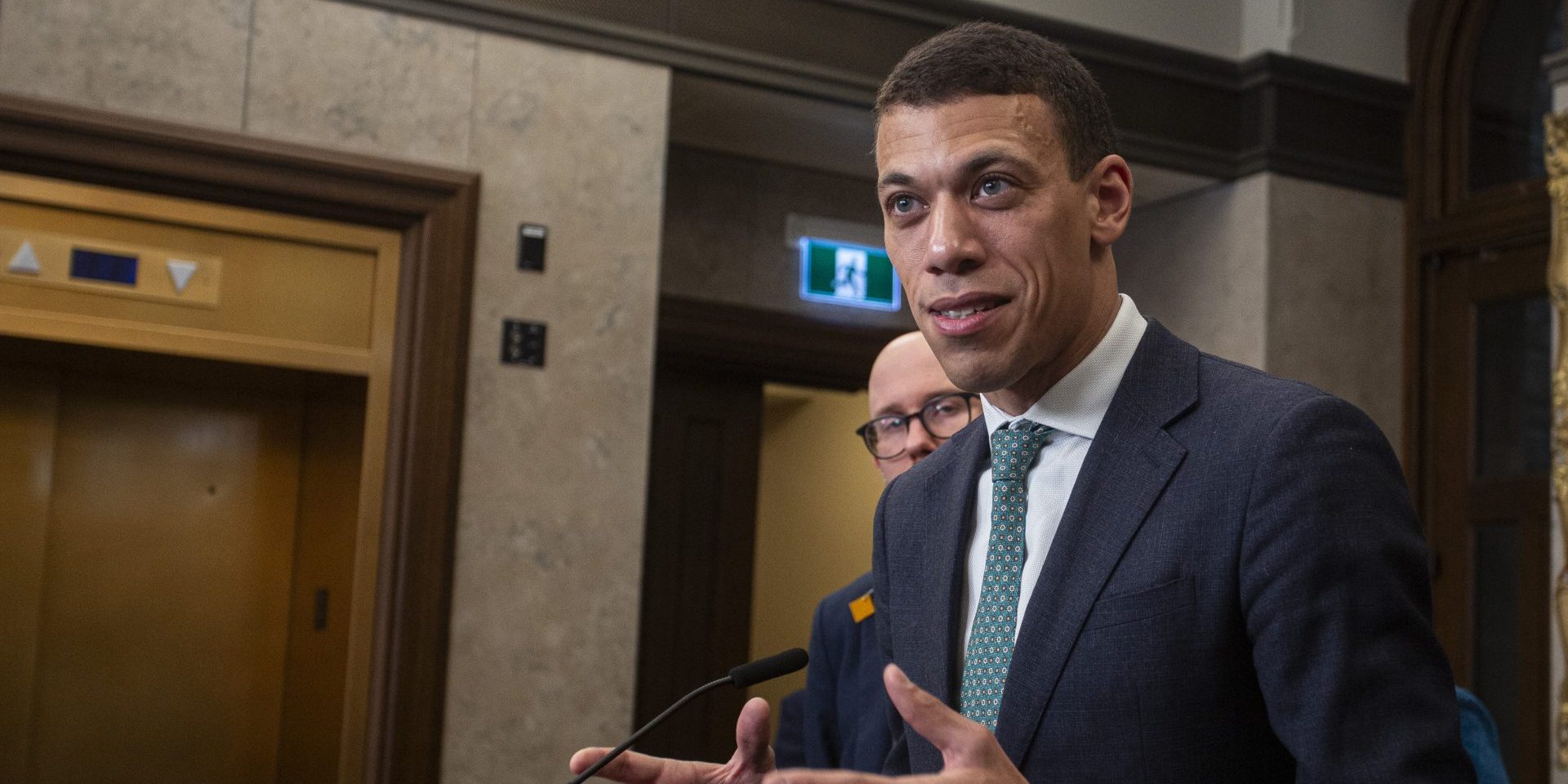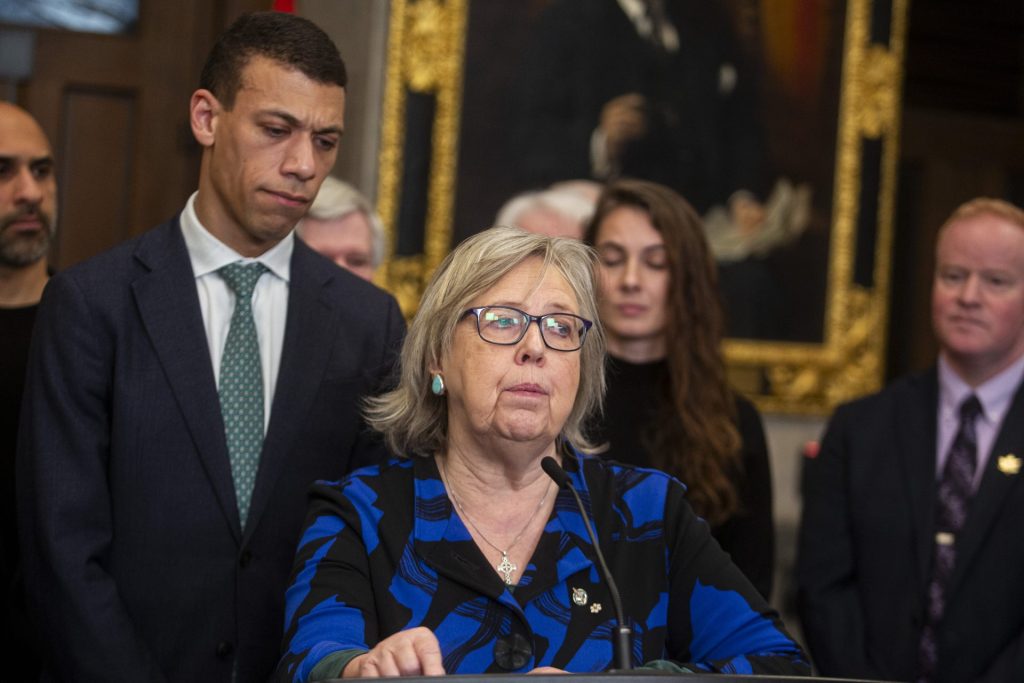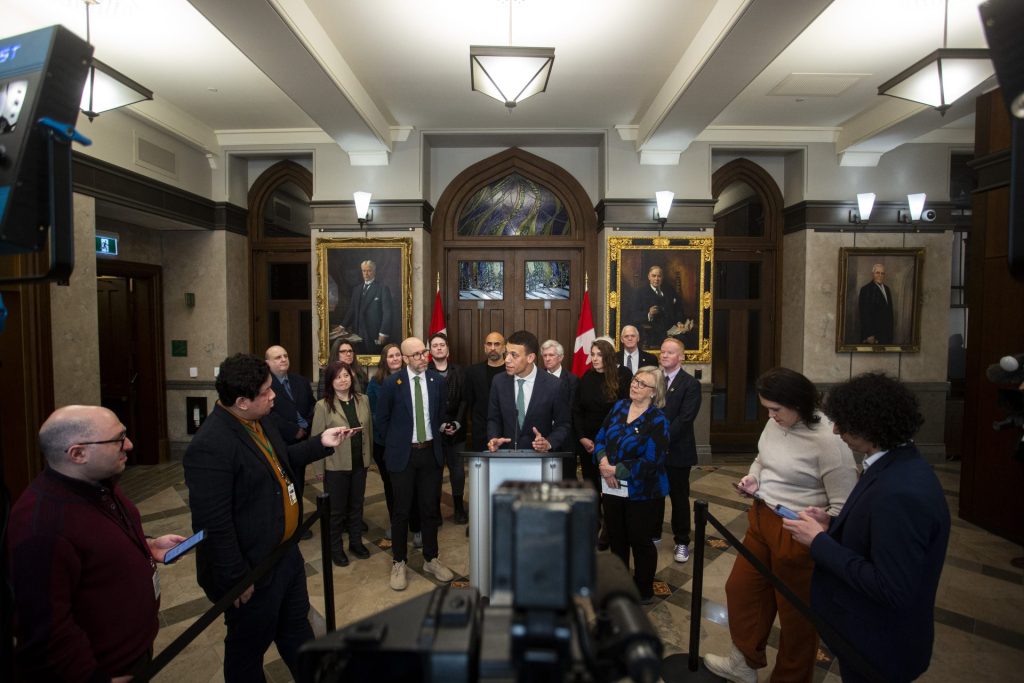Former Green deputy leader Pedneault cites threat of Trump as reason for his return to politics

Jonathan Pedneault says Donald Trump’s re-election as U.S. President was one the major motivations prompting his return as co-leader of the Green Party of Canada only six months after he exited the post.
“Now the tragic, in fact despicable, election south of the border of a president that is assuaging fascism and creating south of the border a threat to our way of living, to our values, meant that I simply couldn’t stand on the sidelines anymore,” said Pedneault to reporters on Jan. 27.
Pedneault stepped down as the deputy leader of the federal Green Party last July, citing “personal reasons.” At the time of his resignation, Pedneault didn’t disclose what those reasons were, but he has now said they were health related.
“Last year, early in the year, I did receive some fairly difficult life-altering news about my health, something that as a 34-year old was somewhat difficult to reckon with. And even though I tried to keep going, at some point it became very clear to me that I needed to take a bit of a step back and reflect about my place, not only in the world and in politics,” said Pedneault, who didn’t elaborate about the nature of those health issues.
After stepping down, the former human rights activist and journalist returned to his previous work in conflict zones, spending time in Georgia and Syria.
“These are difficult times to reckon with. And with 14 years spent in conflict areas, I thought that here was something that I could bring back to politics,” said Pedneault. “I was extremely, extremely glad when the party reached out to me and asked me to come back to assume—pending a vote by the members—the position of co-leader of the Green Party of Canada.”
Co-leadership ‘roadblocks’
During the 2022 leadership race, Pedneault and current Green Party Leader Elizabeth May (Saanich-Gulf Islands, B.C.) ran on a co-leadership model to replace former leader Annamie Paul, who stepped down in 2021.
May previously led the party solo from 2006 to 2019, while Pedneault ran unsuccessfully in the June 2023 byelection in Marc Garneau’s vacated Montreal riding of Notre-Dame-de-Grâce-Westmount. The Green deputy leader came in fourth to the Liberal’s Anna Gainey.
Despite May and Pedneault campaigning as a team, Green Party members never officially changed the party’s constitution to allow for co-leadership. Upon winning the leadership, May appointed Pedneault as deputy leader until the constitution could be amended to a co-leadership model. At that time, May told The Hill Times she wanted to have Pedneault take the lead on the campaign trail if the election did not come until 2025.
However, amending the constitution is a lengthy process in the Green Party, requiring two separate votes in order to ultimately be ratified. When Pedneault stepped down last year, neither of those steps had yet been taken.
The first of those votes finally came in November 2024 at a national general meeting, approving the co-leadership model more than two years after the party’s leadership race. A vote of the entire membership is still needed to ratify the change.
May said adopting a co-leadership model “takes time when you have a grassroots party.”
“The members are the highest authority in our party. We couldn’t decree there’s co-leadership. It needed a meeting of members,” May told reporters on Jan. 27. “We had a couple of meetings where [we] simply ran out of time to deal with all the resolutions before us.”

The Greens attempted to shoot down allegations that delays in making Pedneault the official co-leader were a contributing factor to him walking away last summer.
In French, Pedneault said the party’s internal squabbles are a thing of the past, and that the Greens are now united.
The Toronto Star previously reported that internal private party documents and anonymous sources said that Pedneault was frustrated by the delays in the process, and he blamed internal party roadblocks. The Hill Times reported there were several competing models of co-leadership the party had been weighing. One issue was whether Pedneault would be allowed to move directly into the co-leader role, or have to run in another leadership race.
“There are always issues within every single party. That’s the people that are committed to various strong positions and visions, and that’s something that we welcome in the Green Party of Canada, as opposed to something that we shy away from as other parties often do,” said Pedneault in response to a question about those alleged internal roadblocks.
“My resignation, as I said several times through the press conference, was for personal reasons.”

However, the coming vote will settle any remaining concerns, said May. She said party members will soon be notified that they can vote on the proposed change, as well as other Green Party priorities.
“We’re going to do it a lot faster than the Liberals tell Canadians who their leader is. We’ll be having a result with the members voting that will be out well before March 9,” said May, referencing the date the Liberal Party chooses its successor to Prime Minister Justin Trudeau (Papineau, Que.).
Standing up to ‘bullies’
The Liberal leadership election is something the Greens are looking to capitalize on. With some candidates like Liberal MPs Chrystia Freeland (University-Rosedale, Ont.) and Karina Gould (Burlington, Ont.) saying they would either scrap or freeze the consumer price on carbon, the Greens are looking to position themselves as the party of choice for progressive Canadians and those concerned about climate change.
“They should be ashamed,” said May in response to The Hill Times’ question about the proposed carbon tax pivots.
Pedneault echoed that sentiment, saying the Liberals don’t “stand up for their own values.”
“These are the people who say they’ll stand up to Trump when they backtrack in the face of money thrown by the Conservative Party in attacking them. These are the people that the Liberal Party wants us to think they’ll actually stand up for Canadians when they can’t even stand up for their own values and policies,” he said.
The Greens have said they would be the party that would “stand up” to Trump, and said that they have a unique advantage by being able to connect with other green parties around the globe.
The Green Party is part of a global movement, which May said serves as one of its “comparative advantages” over its rivals.
“There are over 400 elected Green MPs around the world in countries that are also being threatened by Trump. Green MPs in Denmark, Green MPs throughout the European Union, Greens in Ukraine,” said May. “I think we need a global solidarity movement that stands up for democracy and against bullies in all kinds of way.”
May also took the chance to criticize the cadre of tech billionaires at Trump’s Jan. 20 inauguration ceremony like Elon Musk and Mark Zuckerberg, calling them “oligarchs.”
May said she agrees with NDP MP Charlie Angus’s (Timmins-James Bay, Ont.) calls for Canada’s chief electoral officer to investigate possible election interference from Musk. May added that she previously tried to get intervener status at the public inquiry into foreign interference to raise her concerns about the role of non-state actors and foreign corporations into Canadian elections, but was denied.
Commissioner Marie-Josée Hogue will release the final report of the Public Inquiry into Foreign Interference in Federal Electoral Processes and Democratic Institutions on Jan. 28.
But when it comes to Canada’s current predicament with Trump possibly imposing 25 per cent tariffs on Canadian goods on Feb. 1, May said she supports a “dollar-for-dollar retaliatory tariff approach that [is] extremely targeted to try to protect Canada’s economy.”
May told reporters she will be going to Washington, D.C., early in February for the annual U.S. National Prayer Breakfast, where she said she hopes to meet with as many American congressmen and senators she can.
Ontario in the spotlight
Other than May’s upcoming trip to Washington, May said her party’s priorities will be on the possible snap election in Ontario. Multiple media outlets have reported that Ontario Premier Doug Ford is expected to call an early provincial election on Jan. 29.
“We will do everything we can to support the Ontario Green Party as it goes into a snap election,” said May.

But with a possible snap federal election also on the horizon, The Hill Times asked the Greens how election-ready their party was.
“I feel very confident that we will be electing more Greens than we’ve ever elected before, and not just like for one region or one province, ” said May. “We’ll be electing Green MPs from British Columbia, Ontario, Quebec, probably New Brunswick, Prince Edward Island.”
May added that they will have a full slate of federal Green Party candidates that will be announced in the future.
sduch@hilltimes.com
The Hill Times





 LICENSING
LICENSING PODCAST
PODCAST ALERTS
ALERTS













